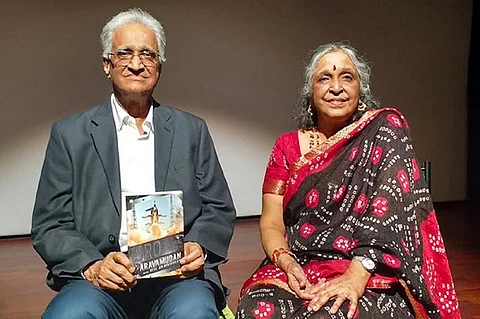

“Whenever I told anyone my dad was a rocket scientist, they'd think I was pulling their leg. It was only when I'd hesitatingly tell them who he was, that even I would realise what an outstandingly brilliant person I was describing,” wrote Sriram, remembering his late father, R Aravumudan.
A pioneer member of the Indian Space Research Organisation (ISRO), R Aravamudan passed away on August 4 at the age of 84. He was among the first people to join the space organisation, then called INCOPAR, and eventually, also, held the position of the director of the Satish Dhawan Space Centre at Sriharikota and the ISRO Satellite Centre in Bengaluru.
The co-author of ISRO: A Personal History, along with his wife, journalist Gita Aravamudan, the late scientist had seen ISRO, from its start, when it had a total budget of just Rs 2 lakh, and when the research facility in Sriharikota was, “’a jungle safari’ with makeshift bridges built on boats, forest paths cleared for jeeps to travel,” Rakesh Mehar wrote for TNM in March 2017, quoting R Aravamudan at the book’s launch.
“He worked five decades in a single organisation, building it up from a seven-member start-up team to the 17k strong technical behemoth that it is today. He was associate director of the Vikram Sarabhai Space Centre in Trivandrum, rose to be the director of ISRO's launch facility in Sriharikota, and ISRO's Satellite Centre in Bangalore. He was my father,” wrote Sriram.
Sriram, with his parents Gita and R Aravamudan. Coutesy: bikerdudeblr/Instagram
R Aravamudan also worked closely with the late Indian President Dr APJ Abdul Kalam, known as the ‘missile man of India’, and built the first telemetry radar of India. In his book, Aravamudan humourously wrote how one project of ISRO scientists that never succeeded was to get Kalam married.
Before he started working at ISRO, a then-fledgling organisation, he worked at India’s Department of Atomic Energy (DAE). It was reportedly in Mumbai that Aravamudan, at the age of 24, heard of Dr Vikram Sarabhai and the latter’s desire to set up a rocket launching station off Thiruvananthapuram. The young scientist then made the shift and worked under Dr Sarabhai, also known as the ‘Father of the Indian Space Programme’, and received training from NASA. Aravamudan described this as a “dreamlike experience” with no recruitment processes, no job interviews.
At an abandoned church in Thiruvananthapuram’s Thumba, their work began on the ‘Equatorial Electrojet’, with a cosy community of 30 scientists working in an ad-hoc manner, making mistakes, and then rectifying them. “At that time, certainly we didn’t imagine that we would build our own satellite launch vehicles and our own spacecraft, set up facilities for our own tracking and all that. If you read Sarabhai’s speech when he dedicated Thumba to the UN, he said we have no dreams of going to the moon or orbiting the planets and all that. At that time, we thought it was all beyond our programme capability. That was in 1968. But looking back today we have done all that and more,” Aravamudan said in 2017.
Aravamudan, APJ Abdul Kalam, HGS Murthy, Ramakrishna Rao and D Easwaradas at NASA's Wallops Launch Station in Virginia. Photo from ISRO: A Personal History
His colleagues told WION News they remember him as “solution-minded” and “seasoned” at dealing with people. Wion News spoke to Former ISRO Chairman Dr K Kasturirangan, who said that Aravamudan, “a smiling man” who worked not for his visibility but always performed up to the task. Gita told Zee Media that ISRO was “his life”, before anyone else – so dedicated was he to the organisation.
Sriram remembers his father as a “man of simple habits, gentle, humble and erudite.”
“He was a devoted husband, an adoring grandfather, and a grounded parent. He could often be critical, but perhaps with the intent of bringing out the best in us. Not many outside the family know this, but he was a very accomplished singer. Among my happiest childhood memories are of listening to All India Radio's classical music programs with him, and being gently assisted in 'guessing the ragam’,” Sriram wrote.
He also wrote about Aravamudan’s struggles with health ailments in the year leading up to his demise. “I often wondered why good people like him were made to endure so much. But perhaps it was the universe's way of ensuring that he was with his loved ones for a longer time. If it is any consolation, his last days were spent in the care of the family he loved so much, surrounded by his adoring wife, sons, daughter-in-law, grandkids and extended family.”
“Whenever I miss him, I'm going to remember him in his favourite chair in a spotless veshti, reading out the headlines to my mom, singing me a line from a krithi, talking sports with my brother, or making his granddaughters squeal in delight as he tossed them up in the air, catching them as they fell,” he added, concluding, “He was my father. I miss him so much, but know that he will always be around looking out for me, and be my guiding force through my life. Bye Appa, I love you.”